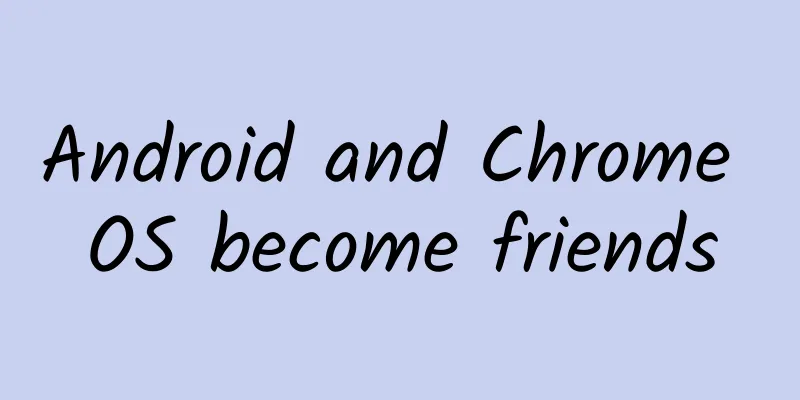Android and Chrome OS become friends

|
This summer's Google I/O was almost a victory conference for the Android camp: the Android family officially became the core brand of Google's smart watches, wearable devices and home entertainment strategies, while Chrome, which had a great success in 2013, was intentionally or unintentionally marginalized by Google. Google sent out an obvious signal: the company is intentionally downplaying the "competitive relationship" between the Android camp and the Chrome camp, with Android continuing to play the leading role and Chrome OS and Chromebook taking on the responsibility of the campus market and "Google Office". Google's solution to "turn enemies into friends" is to make Chrome OS support Android applications. Just yesterday, Google fulfilled its promise this summer and officially announced the first group of four third-party applications adapted for Chrome OS: Evernote, Duolingo, Sight Words and Vine. The name of this project is App Runtime for Chrome (currently in Beta stage), which is mainly for Google to convert Android applications to run on the Chrome OS platform. Google said that they will work with some Android developers to convert more popular Android applications, and users can also give Google feedback on the applications they hope to use on Chrome OS. Google once said at the Google I/O conference that Android developers do not need to make too many changes to their original applications to adapt to Chrome OS, and even only need to make minor adjustments to the UI. However, judging from the current progress, Evernote, Vine and Duolingo, the four applications that have been launched, all have complete web versions, and they are all "active responders" to the multi-platform strategy, so it is not yet possible to see from these apps how other Android developers accept this project. But from Google's perspective, this move is obviously to use the established Android ecosystem to feed back the lack of ecosystem in Chrome OS. Although users can use the web version of some services on Chrome OS, and there are also some native applications, you can also see that since the birth of Chrome OS, its platform development progress is still very slow. It is still a niche product on the desktop and it is difficult to promote its development on smartphones. Therefore, from a cost perspective, it is easier to persuade and help the developers who are already around to devote some of their energy to Chrome than to rebuild a new ecosystem and challenge the position of Windows in the desktop operating system. You can see the change in Google's strategic thinking in the past two years. After the Google I/O conference, Pichai, the director of the Android and Chrome departments, said in a blog that Google is thinking about making it easier and more seamless for people to switch between mobile phones, tablets, computers, TVs, cars and even watches. In the summer of 2013, Google was about to let Chrome replace Android. This new form is the product of "connection" thinking, and the platform competition is no longer that important. Rather than letting Android tablets awkwardly stretch their screens to "challenge" Chromebooks, or Chrome OS insisting on starting its own business and excluding the already established Android ecosystem, it is actually a good thing for both sides to shake hands and make peace. |
>>: Interesting hardware at the TC Conference: the coolest helmet and frying pan
Recommend
Just after Intel poached its chip director, Apple's technical expert left for Microsoft again to develop server chips
Apple's chip design has reached its peak in r...
[Creative Cultivation Program] Can edible straws be eaten as pasta?
Author: Nong Xiaoyi Reviewer: Han Hongwei Walking...
Seven key features you must know before Android M is officially launched
[[145652]] Android Lollipop is obviously loved by...
Solution to iOS 14.5 UDP broadcast Sendto returns -1
[[400268]] This article is reprinted from the WeC...
LG's first 2K screen mobile phone preview
Yesterday, LG's first 2K screen mobile phone i...
Case analysis of information flow advertising in the clothing franchise industry
This is an era of excellence, and with the help o...
Essential for increasing followers: Learn the fission promotion methodology in 5 minutes!
Written in front I personally participated in a c...
"TikTok Short Video Personal IP Content Planning and Operation Course" draws on years of practical experience and teaches you how to implement it
Course Description: The latest practical original...
The voice of the heart • Extraordinary Sihao E20X officially announced the price and the first batch of brand experience stores opened grandly
Volkswagen Group's new joint venture pure ele...
Google won't fix vulnerability affecting 60% of Android phones
Some time ago, Google caused an uproar by disclos...
Collection! Winter vacation myopia prevention and control, just read this article
"In order to guide children and adolescents ...
One article to solve private domain traffic
This article is divided into two parts: The theor...
A complete list of short video operation content models
Recently, many friends have sent me private messa...
Google has worked hard for three years to finally make Android phones upgrade faster
The fragmentation problem of the Android system h...
Konka R1 hands-on review: Can it gain a foothold in the fierce market of thousand-yuan phones?
When it comes to KONKA, most people think of TVs....









